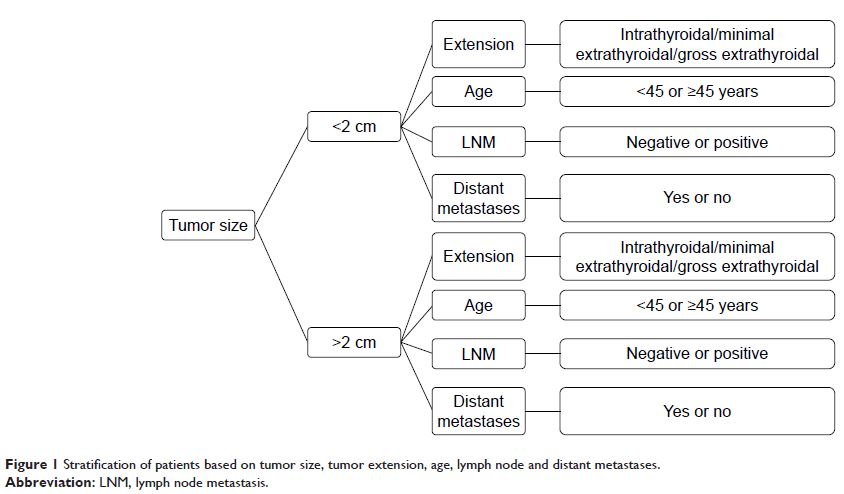108384
论文已发表
注册即可获取德孚的最新动态
IF 收录期刊
- 3.4 Breast Cancer (Dove Med Press)
- 3.2 Clin Epidemiol
- 2.6 Cancer Manag Res
- 2.9 Infect Drug Resist
- 3.7 Clin Interv Aging
- 5.1 Drug Des Dev Ther
- 3.1 Int J Chronic Obstr
- 6.6 Int J Nanomed
- 2.6 Int J Women's Health
- 2.9 Neuropsych Dis Treat
- 2.8 OncoTargets Ther
- 2.0 Patient Prefer Adher
- 2.2 Ther Clin Risk Manag
- 2.5 J Pain Res
- 3.0 Diabet Metab Synd Ob
- 3.2 Psychol Res Behav Ma
- 3.4 Nat Sci Sleep
- 1.8 Pharmgenomics Pers Med
- 2.0 Risk Manag Healthc Policy
- 4.1 J Inflamm Res
- 2.0 Int J Gen Med
- 3.4 J Hepatocell Carcinoma
- 3.0 J Asthma Allergy
- 2.2 Clin Cosmet Investig Dermatol
- 2.4 J Multidiscip Healthc

放射性碘治疗在乳头状甲状腺癌中的作用:基于 SEER 的观察性研究
Authors Tang J, Kong D, Cui Q, Wang K, Zhang D, Liao X, Gong Y, Wu G
Received 24 December 2017
Accepted for publication 29 March 2018
Published 19 June 2018 Volume 2018:11 Pages 3551—3560
DOI https://doi.org/10.2147/OTT.S160752
Checked for plagiarism Yes
Review by Single-blind
Peer reviewers approved by Dr Dekuang Zhao
Peer reviewer comments 2
Editor who approved publication: Dr XuYu Yang
Background: Papillary thyroid
cancer (PTC) is a common endocrine malignancy with relatively good prognosis.
Radioactive iodine (RAI) is considered effective for patients with total or
nearly total thyroidectomy, but the beneficial effects of RAI are still
controversial.
Materials and methods: To determine whether RAI therapy could improve
the survival rates of PTC patients, we conducted a retrospective analysis using
data from the National Cancer Institute’s Surveillance, Epidemiology, and End
Results (SEER) program. Disease-specific survival (DSS) was obtained using
multivariate Cox proportional hazard regressions.
Results: DSS was improved by RAI ablation in patients
with tumor >2 cm, age >45 years and gross extrathyroidal or lymph node
metastasis. In a further analysis, RAI therapy did not improve the DSS in
patients with tumor <2 cm except those with distant metastasis. For patients
with tumor >2 cm, those involving gross extrathyroidal extension, age >45
years or disease in the lymph nodes, DSS was improved after RAI therapy.
Patients with distant metastasis always benefited from RAI ablation.
Conclusion: RAI ablation should be recommended to patients
with tumor <2 cm and distant metastasis or patients with tumor >2 cm and
one of the following risk factors: gross extrathyroidal extension, age >45
years, lymph node and distant metastases.
Keywords: RAI, prognosis,
tumor size, metastasis, extension, age
